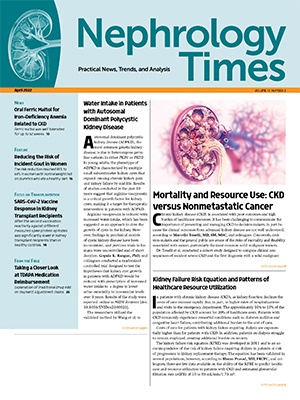
From the Field
Since the last edition of From the Field, the Centers for Medicare & Medicaid Services (CMS) has released instructions regarding how to report difelikefalin, the new drug used to treat ESKD-related pruritus, on dialysis claims for the claim to process correctly. The instruction provided by CMS indicates claims containing charges for difelikefalin. Effective with dates of service starting April 1, 2022, CMS has indicated it will process claims containing charges for difelikefalin the same way Transitional Drug Add-on Payment Adjustment (TDAPA) claims were processed previously. Personally, I am really excited for the opportunity to bill for TDAPA medications because, as I learned when calcimimetics were reimbursed under TDAPA, it presents many interesting challenges when it comes to collecting reimbursement from insurance companies.
Dialysis programs considering providing medications covered under TDAPA to their patients may find it beneficial to understand which insurances are likely to reimburse for the medications and which are likely not to have an idea of the financial impact that utilization of the medication will have on the program. Some things to consider when determining if an insurance, such as contract works insurance, is likely to reimburse for a TDAPA medication are the dialysis program’s contract status with the insurance company, insurance plan type, and current reimbursement type (fee for service, percentage of billed charges, bundled per treatment reimbursement, Medicare rates).
The contracting status of a dialysis facility plays a big role in determining whether the insurance will reimburse for a TDAPA medication. If there is a contract in place, regardless of insurance plan type, the terms of the contract may give you a clue. Contracts that pay an all-inclusive rate per dialysis treatment likely will not provide separate reimbursement for a TDAPA medication unless there is a provision that specifies how medications that are new to the market will be reimbursed under the contract. In the event your dialysis program will be providing significant amounts of TDAPA medications to patients covered by insurances that reimburse dialysis with an all-inclusive rate per treatment, it may be worthwhile to look at renegotiating your agreement.
In the event there is no contract in place, the type of insurance plan may help you determine if reimbursement is a possibility. During the time calcimimetics were covered under TDAPA, the company I work for had the opportunity to work with many commercial, Medicare Advantage, Medicaid, and Medicaid Managed Care plans across the country. Commercial insurance companies were generally slow to add medications to their formulary for coverage when there was no contract in place. Since medications are reimbursed under TDAPA for a relatively short period of time, it was incredibly inconvenient to have commercial insurances take anywhere from 12 to 18 months to add medications to their formulary.
We found traditional Medicaid to be even slower in adding medications to its formulary. Additionally, since Medicaid Managed Care plans frequently reimburse at the same rate and cover the same services as traditional Medicaid, these types of plans typically did not provide reimbursement for TDAPA medications when billed as a primary payer. In the event Medicaid or a Medicaid Managed care plan was billed as a secondary payer, however, we found it would stick to its reimbursement method for Medicare assigned coinsurances. This means that if it had previously paid 100% of the coinsurance assigned by Medicare, it would continue to do so even with the increased coinsurances from the TDAPA medication. However, if Medicaid had previously only issued payment when the amount Medicare paid for dialysis was less than the Medicaid fee schedule, it was highly unlikely secondary payments would be issued by Medicaid.
The last time I had the opportunity to bill for a TDAPA medication, my favorite type of insurance company to work with were Medicare Advantage Plans where the dialysis program did not have a contract. Claims covered by this type of insurance company should be reimbursed at the same rate as Medicare. We frequently found that regional Medicare Advantage Plans were not familiar with TDAPA, and their claims processing systems were not prepared to calculate the reimbursement for TDAPA medications. It was very rewarding for me to work with these insurance companies to help them identify the resources they needed to update their systems and process claims for our clients. Since difelikefalin is the second medication reimbursed under TDAPA I would imagine Medicare Advantage Plans will be better prepared to process TDAPA claims, but I am looking forward to the unique challenges that come with a change to reimbursement.
Sarah Tolson is the director of operations for Sceptre Management Solutions, Inc., a company specializing in billing for outpatient ESRD dialysis programs, nephrology practices, and interventional nephrology. Your questions are welcome, and she can be reached at stolson@sceptremanagement.com, 801.775.8010, or via Sceptre’s website, www.sceptremanagement.com.







 © 2025 Mashup Media, LLC, a Formedics Property. All Rights Reserved.
© 2025 Mashup Media, LLC, a Formedics Property. All Rights Reserved.